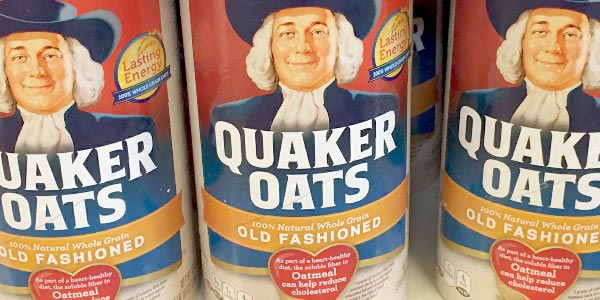As debates over the FDA’s third attempt to define “natural” heat-up, Quaker Oats comes under fire for its labeling claim of “100% natural.” The PepsiCo-owned brand is facing potential class action lawsuits on behalf of consumers in New York and California after traces of the pesticide glyphosate (active ingredient Roundup) were found in some of its oatmeal.
According to Stephanie Strom’s article for The New York Times entitled “Quaker Oats 100% Natural Claim Questioned in Lawsuit,” the level of glyphosate detected falls well below the human consumption limit set by federal regulators. The core issue here is the marketing claim.
As reported by Strom, the lawsuit states the following: “There is nothing unlawful about Quaker Oats’ growing and processing methods. What is unlawful is Quaker’s claim that Quaker Oats is something that it is not in order to capitalize on growing consumer demand for healthful, natural products.”
Quaker Oats maintains that it did not add glyphosate during any part of the milling process, but that it might be applied by farmers to certain grains before harvest. Strom’s post relays that the company puts its oats through a cleansing process and states: “Any levels of glyphosate that may remain are trace amounts and significantly below any limits which have been set by the EPA as safe for human consumption.”
What most consumers do not realize is that the EPA looks to the FDA and USDA for guidance in setting tolerance thresholds. Earlier this year, it was announced that that the FDA would begin testing for glyphosate in 2016—an undertaking previously cost-prohibitive for both the FDA and USDA. So over the last 40 years—aside from a couple of instances—the agencies influencing the EPA threshold for glyphosate residue have not been testing for glyphosate residue.
This likely explains the discrepancy between the European Union’s daily threshold set at 0.3 milligrams per kilogram and the U.S. EPA’s set at 1.75 milligrams per kilogram. Under the European Union’s standard, the 1.8 parts per million found in a sample of Quaker Oats Quick 1-Minute would exceed the human consumption limit.
The practice of applying glyphosate—just before harvest—to non-GMO, non-organic crops like wheat and oats has been popular for about 15 years. Only recently, due to consumer concerns, has it come into question.
The challenge to Quaker Oats’ “100% natural” labeling claim will most likely be the first of many as glyphosate residue testing becomes more widespread and consumer skepticism over its safety heightens. It will be up to the FDA to put a stake in the ground by finishing what it set out to accomplish in 1974. In other words, it is about time for the FDA to provide straightforward guidelines, in the best interest of consumers, for use of the word “natural.”

